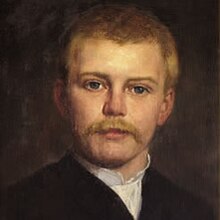Herman Gorter
Herman Gorter (also Hermann Gorter) (born November 26, 1864 in Wormerveer , today part of Zaanstad , † September 15, 1927 in Brussels ) was a Dutch poet and councilor communist theorist.
Life
Herman Gorter - son of a Mennonite minister and writer - studied Classical Philology at the University of Amsterdam since 1883 . Gorter finished his studies in 1889 with a doctorate on the Greek playwright Aeschylus . In the same year he began to work as a high school teacher and published his first literary work with the impressionist epic poem Mei . From 1892 he dealt with the works of Baruch Spinoza and Karl Marx . In 1896 Gorter joined the Sociaal Democratische Arbeiders Partij (SDAP) , founded in 1894 , whose theoretical organ De Nieuwe Tijd he began to edit in the same year.
After the publication of the poem De School of Poezie in 1897, Gorter devoted himself more to party work. From around 1900 he took up the fight against revisionist currents in the SDAP together with Anton Pannekoek . After 1903 he was part of the party leadership. During this time he joined Rosa Luxemburg's positions on mass strike and spontaneity . In 1907 he co-founded the magazine of the left wing of the SDAP, De Tribune, and in 1909, together with Pannekoek and Henriette Roland Holst, initiated the left-wing spin-off SDP . In 1906 he also wrote the poem Een klein heroendicht , which addresses the awakening class consciousness of a proletarian couple.
During the First World War , Gorter wrote the epic PAN and belonged to the internationalist wing of the labor movement . Here he was close to the Zimmerwald movement and stayed in Switzerland from 1917 to 1918, where he maintained close contacts with the embassy of revolutionary Russia. In 1918 he was one of the founders of the CP of the Netherlands .
At the end of 1918 Gorter moved to Germany, where he was active on the left, anti-parliamentary wing of the KPD and, from 1920, in the KAPD . He represented the KAPD in November 1920 at the Comintern Congress in Moscow. In the meantime, Gorter and Pannekoek had been members of the Western European Secretariat of the Comintern from 1919 until they were expelled by the Comintern leadership in 1920 . In 1920 Gorter continued to write his well-known open letter to comrade Lenin , in which he subjected Lenin's “left radicalism”, the childhood disease of communism, to an in-depth criticism. In 1921, Gorter broke completely with the Comintern and created the Communist Workers' Party of the Netherlands with. When the KAPD split up in the same year, Gorter stood on the side of the Essen direction around Karl Schröder and Arthur Goldstein, and with these, in 1922, brought the short-lived Communist Workers' International into being.
Herman Gorter, remembered more as an impressionist poet than a communist theorist in the Netherlands , came 181st in the De Grootste Nederlander survey , which asked about the greatest Dutchman of all time in 2004 . Gorter ranked ahead of Rudi Carrell .
Publications
- A little hero-proof. Versluys, Amsterdam 1908
-
Historical materialism. Explained for workers by Hermann Gorter. Translated from Dutch by Anna Pannekoek. Foreword by Karl Kautsky . Dubber, Hamburg 1910
- Dutch new edition: Het historically materialisme voor arbeiders verklaard. Proletarian Links, Heruitgave 1972
- PAN. A poem. Versluys, Amsterdam 1912
- De School of Poezie. Van Dishoeck, Bussum 1925
- Henriette Roland-Holst. Querido, Amsterdam 1933
literature
- Herman de Liagre Böhl: Met al mijn bloed heb ik voor u gelefd. Herman Gorter 1864-1927. Amsterdam 1996
Web links
- Literature by and about Herman Gorter in the catalog of the German National Library
- Texts by Herman Gorter in the Marxists Internet Archive (English)
- Texts by Herman Gorter in the Marxists Internet Archive
- Gorter, the communist left and the founding of the Communist Workers' International (KAI) on de.internationalism.org
Individual evidence
| personal data | |
|---|---|
| SURNAME | Gorter, Herman |
| BRIEF DESCRIPTION | Dutch poet and councilor communist theorist |
| DATE OF BIRTH | November 26, 1864 |
| PLACE OF BIRTH | Wormerveer |
| DATE OF DEATH | September 15, 1927 |
| Place of death | Brussels |
